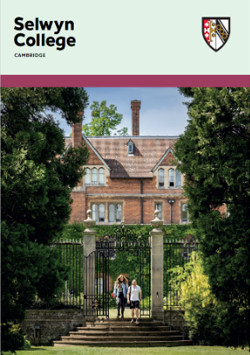Key facts
- Typical offer conditions - A*A*A - A*A*A*, STEP 1,1;
- Required subjects - Mathematics, Further Mathematics;
- Admissions tests - TMUA;
- Interviews - 2 or 3 subject interviews;
- Written work - none;
- Average offers made - 12
The subject at Selwyn
Courses and lectures are the responsibility of the Faculty and are the same for every student reading Mathematics at Cambridge regardless of College. The College’s job is to advise students in their choice of options and to arrange supervisions for them. Mathematicians normally have two supervisions a week in groups of two. Extension of topics from the lectures and set problems are tackled during supervisions. We feel that supervisions are one of the major advantages of a Cambridge education; most other universities run example classes involving large numbers of students.
The Mathematical Tripos includes Computational Project courses which train students to solve analytically intractable mathematical problems using computers.
Selwyn has a thriving Mathematics community that includes many Ph.D. students who contribute to the teaching of undergraduates. They have followed a range of pathways to their research degrees and are an invaluable source of information for our aspirational undergraduates.
The high STEP grades that we normally require as part of our conditional offers for Mathematics reflect both the quality of the candidates we are looking for and the competitive fields that we have attracted recently. The College is conveniently located near the Centre for Mathematical Sciences.
The Teaching Fellows
Professor Nikos Nikiforakis, who is a Director of Studies for Mathematics, and has research interests in the area of Scientific Computing. He is also the Director (Academic Programmes) of the Centre for Scientific Computing of the University of Cambridge, and the Head of the Laboratory for Scientific Computing at the Department of Physics (Cavendish Laboratory). Dr Jack Button, also Director of Studies for Mathematics and College Lecturer in Mathematics. His research interests are in pure mathematics, especially geometric group theory and topology. Dr Gareth Wilkes, also Director of Studies for Mathematics and College Lecturer in Mathematics. His research interests are in pure mathematics, especially algebraic topology and geometric group theory.
Qualities we are looking for
We are looking for lateral thinkers who can use taught knowledge to solve problems in their own independent way and will have a strong commitment to mathematics.
Admissions Assessment -TMUA
As at other Colleges, applicants will be asked to take the Test of Mathematics for University Admission (TMUA). You must take the test at the first sitting. You must be registered in advance to sit the TMUA.
Interviews
Applicants will typically have two mathematics interviews. During these technical interviews we ask questions that we hope the applicants have not seen. This is so that we can assess their innate mathematical ability and minimize the effect of their background. We ask candidates to ‘think out loud’ as they tackle interview problems as a means of helping us understand each candidate’s approach to mathematics.
During your interviews you may also be asked questions that explore some of your wider interests and exploration of Mathematical concepts and applications. You may also be asked some questions arising from your personal statement and in your approach to your academic interests.
Applicants for Mathematics with Physics will also have a short interview on Physics.
Typical offers
Mathematics applicants to Selwyn are asked to obtain good grades both in A-levels (or equivalent) and in Cambridge’s Sixth Term Examination Papers (STEP). We use STEP because we have access to the scripts, which means that we can judge the quality of the answers if necessary. The use of STEP allows us to make more conditional offers than if we relied on A-levels alone (we make around two offers for every place).
Candidates are asked to obtain at least A*A*A at A-level (or equivalent)in Mathematics, Further Mathematics and another subject. In addition candidates will normally be asked to take both Paper II and Paper III of the Mathematics STEP, and to obtain a grade 1 in both papers. Candidates who have taken both Mathematics and Further Mathematics will be better equipped for the intensity and difficulty of the Cambridge Mathematical Tripos.
Applicants to the Mathematics course who take A-Level Mathematics in Year 12, and A-Level Further Mathematics and one other A-Level subject in Year 13 won't usually need to take another A Level in Year 13. Such students will usually be required to achieve A* in the two subjects taken in Year 13, and should be enhancing their subject knowledge through wider engagement beyond their A Levels.
There is a great deal of information about STEP, including copies of past papers and advice on how to approach preparing for the exam, available at https://www.maths.cam.ac.uk/undergrad/admissions/step/.
March 2026


